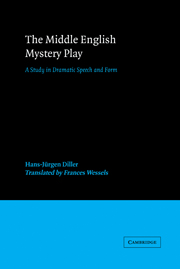Book contents
- Frontmatter
- Contents
- Preface
- Note on texts used
- Abbreviations and special symbols
- Introduction
- Part I The foil: Latin church drama
- Part II The English Creation to Doom cycle
- 5 The origins of the Creation to Doom cycle and its stage
- 6 The representation of time and space in the cycles
- 7 Address to the audience
- 8 Intra-dramatic speeches
- 9 Conclusions
- Notes
- Bibliography
- Indexes
8 - Intra-dramatic speeches
Published online by Cambridge University Press: 04 March 2010
- Frontmatter
- Contents
- Preface
- Note on texts used
- Abbreviations and special symbols
- Introduction
- Part I The foil: Latin church drama
- Part II The English Creation to Doom cycle
- 5 The origins of the Creation to Doom cycle and its stage
- 6 The representation of time and space in the cycles
- 7 Address to the audience
- 8 Intra-dramatic speeches
- 9 Conclusions
- Notes
- Bibliography
- Indexes
Summary
The great importance which the relationship between play and audience has in the English mystery cycles must of necessity reduce the intradramatic relationships. The spectator views the situations which arise in the course of a play not with the eyes of those within the situation, since the bragging speeches, self-introductions and theological comments convey a perspective which is constant throughout the play. But even this rigid perspective, which is one of the most important causes of the ‘twodimensional’ effect of medieval drama, cannot annihilate every relationship between people and situations within the drama. Rather, we shall see that - unlike the liturgical drama - the mystery plays do try to cope with these relationships and that the impression of ‘naïvete’ which the medieval drama so often creates in its modern readers is largely due to the great care which the dramatists took to convey them.
Their verbalization is the subject of this chapter. We shall see that the form of the dramatic speeches is primarily determined by the extralinguistic situation in which they are embedded. For this reason, these situations will be the causa partitionis of the following sections. If we order the speech-types which we can thus identify in an ascending order of complexity, we shall obtain first the ‘revelation speech’ in which God himself speaks without addressing anyone, second the ‘opening prayer’ in which the speaker addresses God at least rhetorically.
- Type
- Chapter
- Information
- The Middle English Mystery PlayA Study in Dramatic Speech and Form, pp. 160 - 250Publisher: Cambridge University PressPrint publication year: 1992



